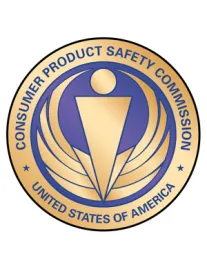Like virtually every other institution, the U.S. Consumer Product Safety Commission (CPSC) was profoundly shaped in 2020 by the COVID-19 pandemic. The challenges of a dispersed workforce and operational uncertainty limited the agency’s operations and forced redesign of processes, from virtual Commission meetings to banners on the agency’s website warning consumers that some companies may be unable to provide recall remedies.
The CPSC’s 2020 was also profoundly shaped by political gridlock and instability. The Commission reached consensus on few significant issues – it took two tries to set a Fiscal Year 2021 Operating Plan – and commissioners were unusually pointed in their disagreements, most prominently Commissioner Peter Feldman and Acting Chairman Bob Adler questioning each other’s enforcement bona fides. The agency’s most noteworthy actions were seemingly unilateral steps from Adler, including announcing the referral of a penalty investigation to the Department of Justice (which Feldman called “an outrageous breach of protocol”) and issuing unilateral press releases about products that had not been recalled.
And of course the emblem of the CPSC’s instability is the seemingly failed nomination of Dr. Nancy Beck to chair the agency, which seems certain to extend the agency’s time under an Acting Chair to four years. The bipartisan opposition to Beck will almost certainly[1] give the Biden administration an early chance to shape agency personnel (and thereby policy) – or may ultimately deprive the agency of a quorum.
So between COVID-19 and political turmoil, 2020 for the CPSC has largely been a year of inactivity, which makes it all the more striking that the agency is, for better or worse, getting more buzz in the last two weeks of the year than it did in the first 50. Two developments are driving this energy – accusations that the CPSC has been derelict in its duty to monitor the nation’s imports of consumer products, and legislation that will both push the agency to renew its commitment to import surveillance and address a handful of CPSC policy questions, including rulemaking on furniture flammability that has been open since the early 1990s.
Balancing Safety Inspections with Inspectors’ Safety
Even in a normal year, given the small size of the CPSC – usually fewer than 550 total employees – and the agency’s massive jurisdiction – more than 15,000 categories of consumer products – it is likely no surprise that the CPSC only has the resources to inspect a tiny fraction of the nation’s consumer product imports. Even the CPSC’s computerized “Risk Assessment Methodology” (RAM) only digitally risk-scores 3-4 percent of those imports, with agency staff physically examining even fewer.
This year, however, the COVID-19 pandemic’s challenges forced CPSC to take measures to protect its workforce – including reducing inspectors’ time spent at the ports – that naturally limited the agency’s ability to put hands on imported products. This move has not been without controversy: USA Today reports that the CPSC’s “total monthly [import-surveillance] activity [for August was] less than 2% of a typical month” and that members of Congress are concerned, noting that Senator Richard Blumenthal (D-CT) intends to hold hearings to look into the matter.
At a minimum, as the world begins to return to something like the pre-COVID normal, the CPSC’s import surveillance activity seems certain at least to return to its pre-COVID levels. Moreover, particularly in light of Adler and Feldman’s discussions of CPSC’s compliance functions, this report and the attention it has generated may spur the agency to publicly demonstrate its commitment to enforcement. Indeed, Adler’s announcement of the DOJ referral came just days after Feldman wrote that the agency had “fallen short in discharging [its law-enforcement] duty.”
Congress Weighs In On Three Major CPSC Policy Issues
The CPSC’s import surveillance efforts have already gotten not just congressional attention but legislative action. The omnibus appropriations act that at this writing had cleared the House and was awaiting action in the Senate included a provision (at page 3117) directing the agency to add staff at the ports, ensure that staff was looking at no less than 90 percent of imports that have been risk-scored, and provide a detailed report to Congress “assessing the risk to consumers associated with the reduction in Commission port inspection activity.” Congressional stakeholders had been collaborating on that language for weeks before the USA Today report, but the story certainly gave the legislation a push.
The CPSC’s place in the omnibus bill isn’t limited to port staffing. The bill also addresses three CPSC policy issues.
-
Most significantly, the omnibus incorporates the SOFFA Act (at page 3122), a bill that would adopt the California upholstered furniture flammability standard known as Technical Bulletin 117-2013 (TB 117) as a national product safety rule. The CPSC has been reviewing its furniture flammability rules for decades, beginning with the issuance of an Advanced Notice of Proposed Rulemaking in 1994. For context, that ANPR was printed in the Federal Register two days before OJ Simpson’s notorious freeway ride.
The difficulty has been defining the addressable hazard. Some have pushed for a standard that would guard against just smoldering ignition sources (like cigarettes), while others have wanted to protect against open flame sources (like candles), which would likely require the incorporation of flame-retardant chemicals. Prior to the 2013 revisions, TB 117 was an open-flame standard, but, as concerns about the prevalence of chemicals in American households grew, California moved to a smolder standard to allow manufacturers to move away from flame retardants.
Many in the CPSC community have advocated a similar shift, but disagreement remains about the question of trading reduced chemical exposure for potentially greater fire hazards. If the SOFFA Act language remains in the omnibus – under the oddly arcane title “COVID-19 Regulatory Relief and Work from Home Safety Act” – Congress would end that debate, and the smolder-focused standard of TB 117 would be the law nationwide.
-
The omnibus also incorporates a bill (at page 2849) that would require the CPSC to demand that portable gasoline containers include flame-mitigation devices, sometimes known as flame arrestors. This legislation is designed to guard against reports of serious injuries from so-called “flashback” explosions, when flame travels up pouring fuel and ignites vapors at a can’s spout. The provision also amends the Children’s Gasoline Burn Prevention Act – which requires child-resistant closures on gas containers – to extend the Act’s requirements to aftermarket spouts. Some at the agency have been concerned that these spouts may deliberately lack child-resistant caps, allowing consumers to “retrofit” their containers to a design that would not be lawful for sale.
-
As has been the case for CPSC appropriations for the last six fiscal years, the omnibus includes (at page 551) a rider barring the CPSC from spending any of its funding to finalize the notice of proposed rulemaking (NPR) the agency issued in 2014 regarding recreational off-highway vehicles (ROVs) unless the CPSC first obtains an effectiveness review of the proposed rule from the National Academy of Sciences. The CPSC’s career staff has repeatedly recommended terminating the rulemaking in light of the advancements of the relevant voluntary standard, but the Commission has twice voted to keep the rulemaking open.
Okay…What’s Next?
The scrutiny surrounding the CPSC’s enforcement efforts – including its work at the ports – and the likely passage of two of the many CPSC-related bills that were introduced in the 116th Congress provide further reason to predict that the agency will be more of a focus in the next few years than it has been for some time.
Of course, the first piece of that focus will be staffing the Commission, with at least two and possibly three vacancies arising in the first half of Biden’s term. Prominent accusations of lax enforcement may lead Biden to nominate a more aggressive, enforcement-minded chair than his trend toward moderation might have suggested, and the bipartisan nature of those accusations may make it difficult for Senate Republicans to mount an effective resistance to such a nominee.
Regardless of the fate of any nominations, however, we expect intense congressional scrutiny on the CPSC and the companies and industries it regulates, with a real possibility of CPSC reform legislation moving in the 117th Congress. It will be important for any CPSC-regulated company both to keep a close eye on what’s being discussed on the Hill and to continue their own compliance efforts to reduce the risk of that scrutiny landing on them.
[1] It’s possible President Trump could re-nominate Beck in January and the Senate could confirm her before Inauguration Day, but it seems exceedingly unlikely.



 />i
/>i

